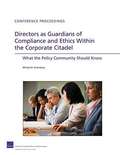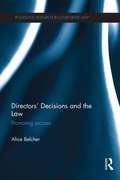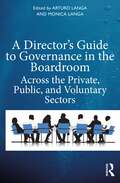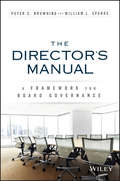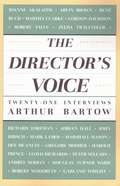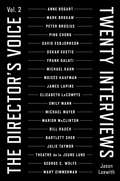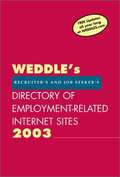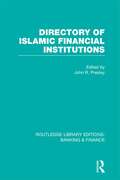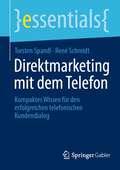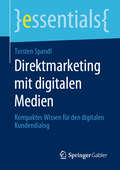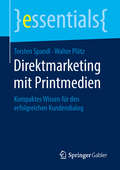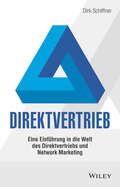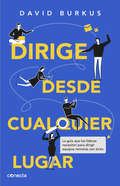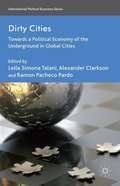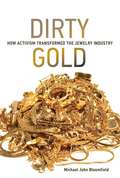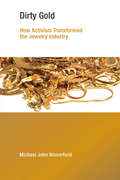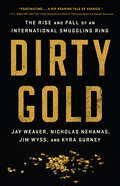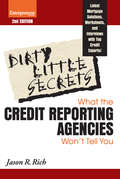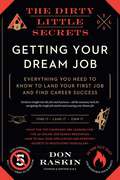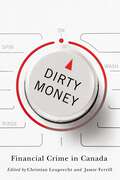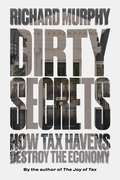- Table View
- List View
Directors as Guardians of Compliance and Ethics Within the Corporate Citadel
by Michael D. GreenbergRAND convened a symposium on the perspective and role of corporate boards of directors in overseeing their firms' ethics and compliance matters. These conference proceedings summarize the event and the discussions, which focused on oversight challenges that directors face, board responsibility for corporate culture, and steps that business leaders and policymakers might take to better encourage and empower directors in their oversight role.
Directors' Decisions and the Law: Promoting Success (Routledge Research in Corporate Law)
by Alice BelcherDirectors are key decision-makers in any organisation, whether it is in the public sector, a family business or a transnational company. The UK Companies Act 2006 codified directors’ duties for the first time and describes the director as the ‘most likely to promote the success of the company for the benefit of its members as a whole’. This book addresses key tensions and problems involved in the duties and responsibilities of the director in promoting success, including corporate culture and credibility, trust, risk and uncertainty, collective responsibility, and the degree of control. The book considers directors’ decision-making in both private and public sector organisations and explicitly examines aspects of decision-making during periods of financial distress. The book compares the legal contexts of director’s decisions in the UK to those of the USA, Germany and Australia, and takes an interdisciplinary approach in its combination of management theory, economic theory and behavioural studies. In doing so the book addresses issues key to the understanding of corporate governance in light of recent financial crises.
A Director's Guide to Governance in the Boardroom: Across the Private, Public, and Voluntary Sectors
by Arturo LangaThis book is a practical guide for executive and non-executive directors and aspiring directors to lead, govern, and steer UK-based organisations to long-term sustainable success. In today’s turbulent environment, corporate governance is increasingly scrutinised, and this book will consider how directors can ‘bring the future forward’ with respect to responsible and ethical governance and leadership against the challenging political, environmental, and economic backdrop. While other books discuss UK corporate governance, this one uniquely demonstrates how the work of directors can build an organisation’s antifragility, and offers a view of stewardship approaches to every sector and type of UK organisation, from large premium listed companies to start-ups, the public sector, not-for-profits, partnerships, and family-owned and private-equity-backed organisations. Aspiring and experienced directors will each benefit from this book as well as those who provide board evaluation services, professional advisers, auditors, and those who provide training and other support for board members.
A Director's Guide to Governance in the Boardroom: Across the Private, Public, and Voluntary Sectors
by Arturo LangaThis book is a practical guide for executive and non-executive directors and aspiring directors to lead, govern, and steer UK-based organisations to long-term sustainable success. In today’s turbulent environment, corporate governance is increasingly scrutinised, and this book will consider how directors can ‘bring the future forward’ with respect to responsible and ethical governance and leadership against the challenging political, environmental, and economic backdrop. While other books discuss UK corporate governance, this one uniquely demonstrates how the work of directors can build an organisation’s antifragility, and offers a view of stewardship approaches to every sector and type of UK organisation, from large premium listed companies to start-ups, the public sector, not-for-profits, partnerships, and family-owned and private-equity-backed organisations. Aspiring and experienced directors will each benefit from this book as well as those who provide board evaluation services, professional advisers, auditors, and those who provide training and other support for board members.
The Director's Manual: A Framework for Board Governance
by Peter C. Browning William L. SparksDirectors: Improve Board Performance The Director's Manual: A Framework for Board Governance offers current and aspiring board members essential up-to-date governance guidance that blends rigorous research-based information with the wisdom found only through practical, direct experience. The book's flexible approach to solving governance issues reflects the authors' belief that no two boards and the cultural dynamics that drive them are the same. As such, the advice offered reflects recognizable leadership dynamics and real world, relevant organizational situations. The book's two authors, Peter C. Browning, an experienced CEO and member of numerous boards and William L. Sparks, a respected organizational researcher, combine their individual experiences and talents to create a book that is both innovative and applicable to directors in any industry sector. Specific best practice guidance is designed to help board members and their directors understand the unique strengths and challenges of their own board while at the same time provide targeted information that drives needed improvements in board performance and efficiency. Specifically, this book will help board members: Explore practical advice on key issues, including selection, meeting schedules, and director succession Consider board performance from multiple perspectives, including cultural and group dynamics Discover how to effectively manage classic problems that arise when making decisions as a group Access a comprehensive set of assessment questions to test and reinforce your knowledge The Director's Manual: A Framework for Board Governance offers practical advice to guide you as you lead your organization's board.
The Director's Voice
by Arthur BartowForemost stage directors describe their working process: JoAnne Akalaitis, Arvin Brown, René Buch, Martha Clarke, Gordon Davidson, Robert Falls, Zelda Fichandler, Richard Foreman, Adrian Hall, John Hirsch, Mark Lamos, Marshall W. Mason, Des McAnuff, Gregory Mosher, Harold S. Prince, Lloyd Richards, Peter Sellars, Andrei Serban, Douglas Turner Ward, Robert Woodruff, and Garland Wright.
The Director's Voice, Vol. 2
by Jason Loewith"Directors today are equipped with a larger toolbox than their forerunners, standing on their shoulders as well as those of pioneers in non-Western theater, experimental visual art, community-based theater, and the ever-evolving commercial theater scene."-- Jason LoewithThis second volume presents a cross-section of the most diverse and dynamic stage directors defining today's American theater, in conversation with director/producer Jason Loewith. A follow-up to the immensely popular first volume, which has sold over eighteen thousand copies, much has changed in the twenty years since The Director's Voice debuted. "The nonprofit model has been turned on its head," Loewith notes. "Institution-building is out for these directors; creating a distinctive voice from a multiplicity of influences is in." Together, these directors sketch a compelling portrait of the art form in the new century.Interviews include: Anne Bogart, Mark Brokaw, Peter Brosius, Ping Chong, David Esbjornson, Oskar Eustis, Frank Galati, Michael Kahn, Moisés Kaufman, James Lapine, Elizabeth LeCompte, Emily Mann, Michael Mayer, Marion McClinton, Bill Rauch, Bartlett Sher, Julie Taymor, Theatre de la Jeune Lune (Barbra Berlovitz, Steven Epps, Vincent Gracieux, Robert Rosen, and Dominique Serrand), George C. Wolfe, and Mary Zimmerman.Jason Loewith is a producer, director, and writer. He has served since 2002 as artistic director of Chicago's Next Theatre Company, where he conceived, co-wrote, and produced Adding Machine: A Musical, which had an award-winning run off-Broadway.
Directory of Employment-Related Internet Sites
by Peter D. WeddleThere are over 40,000 employment-related sites currently operating on the Internet. These job boards, resume databanks and career portals can give you a powerful advantage in the search for talent and in finding a new or better job. How can you take best advantage of these resources? Whether you're a job seeker or career activist, a recruiter or HR professional, the key to success is smart shopping-picking the right site for your particular situation and location. But to shop smart online, you need to know your options. And that's where WEDDLE's 2003 Directory of Employment-Related Internet Sites comes in! It is the most comprehensive and up-to-date listing of these sites in print, and it's been completely updated for 2003. In WEDDLE's Directory, you'll find over 6,000 sites organized in three categories: * Career field (e.g., sales and marketing, finance and accounting, human resources, engineering). * Industry (e.g., healthcare, banking, construction, insurance). * Location (including every state in the Union and more than 25 countries). All you have to do is find the category of interest to you, and "let your mouse do the clicking!" Each site is listed by name and its address (also called its Universal Resource Locator or URL) on the Internet. That way, you can find just the right sites for you, quickly and easily.
Directory of Islamic Financial Institutions (Routledge Library Editions: Banking & Finance)
by John R. PresleyWhen originally published this was the first reference book to address itself to Islamic banking and finance and it offers comprehensive information on all major institutions which have commercial or banking interests in this field. It includes analysis of the principles behind interest-free banking and indicates its relationship with financial institutions in both Islamic countries and Western ones. It also lists the laws governing interest-free banking in countries where it is extensively in operation and provides essential information for all international financial institutions. The Directory lists all banks and financial institutions by country, giving details of their specific role and areas of operation.
Direktmarketing mit dem Telefon: Kompaktes Wissen für den erfolgreichen telefonischen Kundendialog (essentials)
by Torsten Spandl René SchmidtDas Telefon besitzt eine besondere Bedeutung für erfolgreiche Direkt- und Dialogmarketingaktionen. Es ist die direkteste Kommunikationsform, die Vertrieb und Verkauf zur Verfügung steht.Wie setzt man das Telefon richtig ein? Welche Arten von Telefonaten gibt es? Wie plant man erfolgreiche telefonische Direktmarketingaktionen? Und was sind die besten Tipps und Tricks beim Telefonieren? Diese Themen behandelt das vorliegende essential zum erfolgreichen telefonischen Direktmarketing. Strukturiert und praktisch, direkt umsetzbar und gut zu planen. Mit diesem praxisnahen Buch sind Sie für die nächste telefonische Direktmarketing-Aktion optimal vorbereitet.
Direktmarketing mit digitalen Medien: Kompaktes Wissen für den digitalen Kundendialog (essentials)
by Torsten SpandlDieses essential zeigt praxisnah, wie sich Direktmarketing durch digitale Medien schnell und erfolgreich umsetzen lässt. Die E-Mail ist als Klassiker immer noch sehr relevant, mal für gezielte Nachrichten mit geplanten Ansprache-Sequenzen, mal als Newsletter an ausgewählte Kundengruppen. Auch die sozialen Netzwerke sind ideale Dialogmarketing-Instrumente, die erfolgreiche Unternehmen heute nutzen. Das essential stellt die wichtigsten Grundsätze zusammen und versorgt Sie mit vielen Tipps und Tricks, wie Direkt- und Dialogmarketing besser und erfolgreicher wird.
Direktmarketing mit Printmedien: Kompaktes Wissen für den erfolgreichen Kundendialog (essentials)
by Torsten Spandl Walter PlötzDieses essential zeigt, wie Direktmarketing gekonnt und gewinnbringend eingesetzt wird. Direktmarketing ist eines der wichtigsten Marketing-Instrumente für B2C- und B2B-Kommunikation. Es stellt den 1:1-Kontakt her und erreicht Kunden individuell. Gutes Direktmarketing findet viele Kontaktanlässe, um Kunden mehrfach pro Jahr zu erreichen und eine gute Datenqualität sorgt für steigende Erfolgsquoten und erfolgreiche Kampagnen. In diesem Band finden sich Anlässe und Ideen für den Redaktionsplan des Direktmarketings, die wichtigsten Regeln für den Kundendialog, Kreativitätsanregungen für die Direktmarketing-Aktion und die praktische Umsetzung von Direktmarketing mit Printmedien.
Direktorenwahlen – ein Vertrauensvotum: Einfluss von Gesichtsmerkmalen auf die Wahl US-amerikanischer Board-Direktoren
by Felix W. SchwederEin Gesicht vermittelt in nur 34 ms konsistent und relativ reliabel nicht nur objektive, sondern auch subjektive Personenmerkmale. Valide oder nicht – dieser unbewusst generierte Code repräsentierter personeller Eigenschaften ist äußerst löschungsresistent. In der vorliegenden Arbeit wird untersucht, ob und in welchem Ausmaß attraktive, kompetente, vertrauenswürdige oder sympathische Gesichtsausdrücke US-amerikanischer Board-Direktoren für deren Wahl relevant sind. Die Schätzungen der linearen Paneldaten basieren auf großen Stichproben und liefern repräsentative Ergebnisse. Die breite Auswahl potenzieller Einflussfaktoren auf das Wahlverhalten der Aktionäre schließt wesentliche verzerrende Einflüsse aus. Erstmals im Kontext der Untersuchung von Aktionärswahlverhalten wird zur Kontrolle von Stimmenzurückhaltungen/ Gegenstimmen ein in der Forschung zur Gesichtswahrnehmung etabliertes objektives Maß verwendet - das Facial Width-to-Height-Ratio.
Direktvertrieb: Eine Einführung in die Welt des Direktvertriebs und Network Marketing
by Dirk SchiffnerDas Buch von Dirk Schiffner schließt eine Lücke und erklärt den Direktvertrieb in seiner Gesamtheit. Es soll das Standardwerk für den Direktvertrieb werden und zum Verstehen der Systeme und Arbeitsweisen dieses Vertriebskanals beitragen. Sehr strukturiert wird das "Warum", "Was", "Wer" und "Wie" behandelt. Darüber hinaus werden verschiedene - zum Teil vom Autor selbst entwickelte - Modelle vorgestellt und erklärt, wie zum Beispiel seine DS Salesforce Matrix. Schiffner beschreibt die Sales-Systeme und die spezifischen Marketing Ps in diesem Feld. Der Autor bringt seine Expertise aus 18 Jahren Erfahrung im Direktvertrieb in dieses Buch ein. Damit verfügt er über einen einzigartigen Erfahrungsschatz in dieser Branche, an dem er nun die Leser teilhaben lässt.
Dirige desde cualquier lugar
by David BurkusEstamos entrando en una nueva era de trabajo remoto, pero ¿cómo pueden los líderes asegurarse de que su negocio funcione como antes cuando la manera de trabajar se ha vuelto tan diferente? Los más recientes estudios demuestran que las personas son más productivas y comprometidas cuando tienen la libertad de trabajar desde cualquier lugar, lo que significa que los líderes deben desarrollar habilidades de liderazgo en todo terreno. David Burkus ha realizado una profunda investigación sobre equipos virtuales y casos de estudio de compañías que no sólo han sobrevivido, sino que han triunfado en el trabajo a distancia. Como resultado, ha desarrollado una guía para para dirigir equipos remotos que ayudará a los líderes a enfrentar los retos del nuevo panorama laboral: desde contratar e introducir a nuevos miembros a tu equipo, crear una cultura remota y asegurar la productividad, hasta comunicar rápidamente, retener a tus colaboradores más valiosos y lograr que tus colegas alcancen el equilibrio entre la vida personal y el trabajo. En Dirige desde cualquier lugar encontrarás todo lo que necesitas para triunfar como líder remoto, lo cual será imprescindible de ahora en adelante para todos los que estén al frente de un equipo.
Dirk Nowitzki: Changing the Game
by Boris Groysberg Evan M S Hecht Sascha L. SchmidtNBA Superstar Dirk Nowitzki was unsure whether the 2018-19 season would be his last as an NBA player. He had not faced such uncertainty since 1998, when he had navigated a difficult decision regarding the timing of his move to the NBA. He also did not know what he would do when he ultimately retired, as playing basketball was all he had known for his entire adult life. His foundation in Dallas and in Germany provided grant money and strategic support to youth programs; he could become more directly involved in the foundation's work. The Dallas Mavericks had made it clear that they would be open to Nowitzki transitioning to a role as some type of executive or coach, helping the Mavericks make decisions and/or develop their young players. Nowitzki was also intrigued by the idea of becoming an independent mentor for young, amateur players; after all, his mentor, Holger Geschwindner, had been instrumental in his development, and he liked working with young people. Keeping his various options in mind, how should Nowitzki plan for the next phase of his life and career?
Dirty Cities
by Leila Simona Talani Alexander Clarkson Ramon Pacheco PardoOver the last three decades, the rapid growth of transport and telecommunications systems and the expansion of transnational diasporas have intensified links between the urban spaces of Europe, Africa, the Middle East and Southeast Asia. Increasing global mobility has fostered the development of 'informal' trading networks in which diaspora communities play a central role. As a consequence, the shadow economies of societies with vastly different levels of prosperity have begun to come into contact with one another. While the economic consequences of diaspora trading networks have been extensively explored over the past few decades, the impact of globalization on the economic underground has received much less attention. This volume elaborates on the definition of globalization, on its impact on illegal and illicit activities, and on the role of the 'Global City' as the intersection between the local and the global which allows for the empowerment of generally marginalized actors often through technological progress. The contributors explore the dark side of globalization, more specifically, the relations between globalization and the new dynamics of legal/illegal practices in urban settings of global cities.
Dirty Gold: How Activism Transformed the Jewelry Industry
by Michael John BloomfieldGold mining can be a dirty business. It creates immense amounts of toxic materials that are difficult to dispose of. Mines are often developed without community consent, and working conditions for miners can be poor. Income from gold has funded wars. And consumers buy wedding rings and gold chains not knowing about any of this. In Dirty Gold, Michael Bloomfield shows what happened when Earthworks, a small Washington-based NGO, launched a campaign for ethically sourced gold in the consumer jewelry market, targeting Tiffany and other major firms. The unfolding of the campaign and its effect on the jewelry industry offer a lesson in the growing influence of business in global environmental politics. Earthworks planned a "shame" campaign, aimed at the companies' brands and reputations, betting that firms like Tiffany would not want to be associated with pollution, violence, and exploitation. As it happened, Tiffany contacted Earthworks before they could launch the campaign; the company was already looking for partners in finding ethically sourced gold.Bloomfield examines the responses of three companies to "No Dirty Gold" activism: Tiffany, Wal-Mart, and Brilliant Earth, a small company selling ethical jewelry. He finds they offer a case study in how firms respond to activist pressure and what happens when businesses participate in such private governance schemes as the "Golden Rules" and the "Conflict-Free Gold Standard." Taking a firm-level view, Bloomfield examines the different opportunities for and constraints on corporate political mobilization within the industry.
Dirty Gold: How Activism Transformed the Jewelry Industry (Earth System Governance)
by Michael John BloomfieldThe response from the jewelry industry to a campaign for ethically sourced gold as a case study in the power of business in global environmental politics.Gold mining can be a dirty business. It creates immense amounts of toxic materials that are difficult to dispose of. Mines are often developed without community consent, and working conditions for miners can be poor. Income from gold has funded wars. And consumers buy wedding rings and gold chains not knowing about any of this. In Dirty Gold, Michael Bloomfield shows what happened when Earthworks, a small Washington-based NGO, launched a campaign for ethically sourced gold in the consumer jewelry market, targeting Tiffany and other major firms. The unfolding of the campaign and its effect on the jewelry industry offer a lesson in the growing influence of business in global environmental politics. Earthworks planned a “shame” campaign, aimed at the companies' brands and reputations, betting that firms like Tiffany would not want to be associated with pollution, violence, and exploitation. As it happened, Tiffany contacted Earthworks before they could launch the campaign; the company was already looking for partners in finding ethically sourced gold.Bloomfield examines the responses of three companies to “No Dirty Gold” activism: Tiffany, Wal-Mart, and Brilliant Earth, a small company selling ethical jewelry. He finds they offer a case study in how firms respond to activist pressure and what happens when businesses participate in such private governance schemes as the “Golden Rules” and the “Conflict-Free Gold Standard.” Taking a firm-level view, Bloomfield examines the different opportunities for and constraints on corporate political mobilization within the industry.
Dirty Gold: The Rise and Fall of an International Smuggling Ring
by Nicholas Nehamas Jay Weaver Jim Wyss Kyra GurneyThe explosive story of the illegal gold trade from South America, and the three Miami businessmen who got rich on itIn March of 2017, a team of FBI agents arrested Juan Granda, Samer Barrage, and Renato Rodriguez, or as they called themselves, "the three amigos." The trio--first identified publicly by the authors of this book-- had built a $3.6 billion dollar business in metals trading, mostly illegal Peruvian gold.Their arrests and subsequent prosecution laid bare more than a corrupt finance firm, though. Instead, Dirty Gold lifts the veil on an illegal international business that is five times as lucrative as trafficking cocaine, and arguably more dangerous.As the award-winning team of Miami Herald reporters show, illegal gold mines have become a haven for Latin American drug money. The gold is then sold to metals traders, and ultimately to Americans who want it in their jewelry, smartphones, and investment portfolios. By following the trail of these three traders, Dirty Gold leads us into a criminal underworld that has never before been in full view.
Dirty Hands: When Managers Are Forced to Choose Between Right and Right
by Joseph L. Badaracco Jr.Positions of power carry complicated responsibilities. On some occasions, these responsibilities conflict with each other. At other times, they conflict with a manager's personal values. All of these responsibilities, personal and professional, have strong moral claims, but often there is no way for a manager to meet every claim. These are not the ethical issues of right and wrong that we learn about as children. They are conflicts of right versus right. The right-versus-right choices that managers are forced to make become defining moments, and this chapter presents some important questions for thoughtful managers to ask themselves: Do you think you can govern innocently? How do you think about defining moments? How do you resolve them in ways you can live with? This chapter is excerpted from "Defining Moments: When Managers Must Choose between Right and Right."
Dirty Little Secrets
by Jason R. RichWhat the credit bureaus don't tell you can cost you thousands. Jason Rich unearths these dirty little secrets in this tell-all expose' aimed at immediately improving your credit report. Whether you have credit problems, are trying to establish credit or want to improve your credit score, this previously undisclosed advice can help you save hundreds, perhaps thousands of dollars every month.
The Dirty Little Secrets of Getting Your Dream Job
by Don RaskinDrawing on his extensive experience evaluating applicants for his marketing agency, and featuring stories based on real-life situations, sample cover letters, resumes, and straightforward advice, Don Raskin's The Dirty Little Secrets of Getting Your Dream Job offers all the necessary tools for navigating the tough job market and securing your dream job.Don Raskin owns and operates MME, an advertising and marketing agency in New York City. During his twenty-five years at the agency he has interviewed hundreds of new college graduates for positions within his agency and has placed a strong emphasis on entry-level recruitment for positions in creative, account management, traffic, and production. Raskin has also mentored countless students and their parents on best practices for the job search. Over the years, Raskin has kept exceptionally detailed notes on the interviews he has conducted, observing the good, the bad, the ridiculous, the irreverent. He also has a treasure trove of over-the-top cover letters, resumes, interviews, and post interview follow-ups he has conducted and received. Now, he wants to share all the wisdom and insider secrets he has gathered to help students and first-time job seekers find a job in this economy. Based on his remarkable expertise, Raskin's book provides exclusive insight into the job search process and lets readers in on all of the dirty little secrets to landing their first job--or a new one--and finding career success.
Dirty Money: Financial Crime in Canada
by Christian Leuprecht and Jamie FerrillFinancial crime in Canada remains a mystery: omnipresent, but we know little about its operation. Transactions are cloaked with apparent legality, which makes tracking criminal activity through economic or financial statistics a complex undertaking.This distinctive volume aims to stem in-, out-, and through-flows of vast sums of dirty money by enhancing Canada’s capacity to detect, disrupt, deter, investigate, and prosecute domestic financial criminals and transnational organized criminal organizations. It brings together leading scholars and practitioners from the public and private sectors to identify and explore deficiencies in federal and provincial policy, regulation, legislation, politics, institutions, and enforcement, as well as the international financial crime regime. Together contributors pinpoint weaknesses that have turned the Canadian federation into a destination of choice for global financial crime, where its perpetrators can operate with impunity.Dirty Money reveals how globalization and technology have spun an extensive web of clandestine processes that disguises how financial criminals operate, the channels they use, and how they suborn banks and institutions. In the process, the extent of financial crime in Canada and its corrosive effects on communities, democratic institutions, and prosperity becomes apparent.Contributors: Sanaa Ahmed, John Cassara, Garry Clement, Arthur J. Cockfield, Caroline Dugas, Jamie Ferrill, Cameron Field, Michelle Gallant, Peter German, Rhianna Hamilton, Todd Hataley, Caitlyn Jenkins, Christian Leuprecht, David Maimon, Katarzyna (Kasia) Mcnaughton, Denis Meunier, Pierre-Luc Pomerleau, Stephen Schneider, Jeffrey Simser.
Dirty Secrets: How Tax Havens Destroy the Economy
by Richard MurphyWhat happens when the rich are allowed to hide their money in tax havens, and what we should do about itThe Panama Papers were a reminder of how the superrich are allowed to hide their wealth from the rest of us. Dirty Secrets uncovers the extent of the corruption behind this crisis and shows what needs to be done in the face of this unregulated spread of rampant greed.Tax havens, we are often told, are part of the global architecture of capitalism, providing a freedom from regulation necessary to make markets work. In this book, leading authority Richard Murphy uncovers the truth behind this lie. The fact of the matter is that this increasingly popular practice threatens the foundations of democracy, sowing mistrust and creating a regime based upon opacity.As Murphy shows, how we manage our economy is a political decision, and one that can be changed. Dirty Secrets proposes ways to regulate tax havens and what the world might look like without them.
